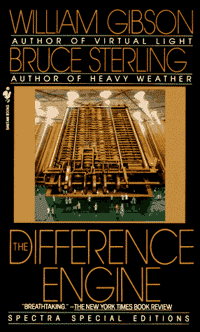Bill: I actually have a question for you.
Allana: Hit me.
Bill: You mentioned before we started this that you generally like to read fiction as a self-contained experience, without external research, etc. But clearly this book requires quite a bit of knowledge about the actual period to fully grasp what is going on, and this information is not all contained in the text. What is your take on the experience?
Allana: That I'm at a clear disadvantage. And that having someone around to keep me on my toes (that's you!) is essential to the book ever being read at all. It's completely changed the reason for the behaviour. It's entirely the game of hunting down obscure references, the excuse to wander aimlessly through Wikipedia links, the feeling of needing to be prepared for our chats.
To be honest, this iteration left me cold, stylistically. I feel like the story is empty in and of itself -- if this is really just a detective caper with some slick characters and a few sporting events, I would never have wasted my time. And I don't enjoy the dialogue, and I really would've given the book back to the library by now, after the overuse of the word "utter." I'm not joking; it really turned me off. So, I don't know.
It's important to note that if I had zipped through this book without pacing myself, I might've at least shrugged and said, "It's okay." If you wanted me to review it as a casual reader, I don't know what I would've said.
Bill: When I was reading science fiction after I moved to California -- really just diving into it, one book after another -- even then it was partly as springboards to discovering other avenues of knowledge. The books were never a self-contained experience for me -- and part of what I loved about them was the outside things they pointed me to. So I think I've always used books in this genre to generate ideas and find interesting things to follow outside their pages. Books about colonizing Mars led me to learn a lot about actual Mars. Heinleinian superpeople led me to read up on lots of areas of human mental and physical enhancement. Asimov's Foundation books led me to learn a bit about statistical analysis, oddly. Fantasy books used to be more or less self-contained experiences to me, though even those got me interested in sort of comparative mythology, and I had to stop reading them after it became clear how shallowly many of them were built on the same few mythological tropes.


Bill: All of this is not to say that the self-contained experience route is not legitimate; I just want to find out if this is nudging you at all into the camp of enjoying fiction as a springboard, more than as a microcosm. Does that make sense?
Allana: It does, and it isn't. Fiction is never really that interesting to me past the style in which it's written, the subjects it treats or mistreats. Sure, I reference stories in conversations -- but only if I'm already having a conversation about gender-switching, or artificial humans, or alternative planets, or whatever. Most of the time, whether it's visual art or music or film, I treat the medium within its own borders, you know? When I see amazing art (and I'll get you a link in a minute) I think about how much I wish I could replicate it, or get jealous about not thinking of it first.
I have been thinking, since I started reading Don DeLillo, about how often he includes subjects I'm already familiar with - cultural studies departments, video art, body performance. I'm having the biggest difficulty reading Underworld, which uses a certain baseball as the same sort of plot-driver as the punch cards in The Difference Engine. And it's not that I don't like baseball, but I've not yet found a writer that can make sports exciting in fiction. But describing how people respond to art installations? Always compelling.
Anyway, this brings us back to our chicken-and-egg conversation from last time.
Bill: How so? You mean, do transgressive people seek transgressive fiction, or does transgressive fiction make people transgress? That chicken and egg?
Allana: Yes, those precise creatures. Do I find myself looking kindly upon DeLillo's style because he treats topics I enjoy, or is his style already appealing in its own right?
Bill: Oh, okay, I see what you mean. I don't know -- style, to me, is like music. The content is like lyrics. When I like a song, it's usually for the lyrics. Great music enhances the experience, but I can like mediocre music if the lyrics are good. But bad lyrics spoil a song for me, even if the music is wonderful. And terrible music can spoil even a well-written song. I know people who are the opposite, who listen to songs for the musical experience, and hardly even think about the lyrics.
Allana: An excellent analogy, because I'm the exact reverse.
Bill: Ha!
Allana: The majority of the time, I like my music without lyrics, but even the worst lyrics are tolerable if the music is good enough. I just had a fit because I generally dislike female vocals, but the new Four Tet album seems designed to make me eat my words. Even with simple samples.




No comments:
Post a Comment